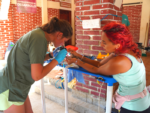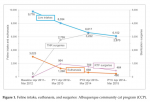Positive Doesn’t Need to Be Negative: Adopting and Living With an FIV-Positive Cat
By: Dr. Linda Jacobson, President, Canadian Animal Shelter & Community Medicine Association This is a repeat of a blog Dr. Jacobson guest-wrote for the OSPCA recently. The content is mostly geared toward prospective adopters, but should be of interest to other shelter staff, including medical staff. (Photos – Toronto Humane Society). FIV stands for “feline […]




















